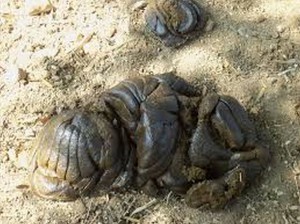 Washington, DC, February 19 – A new study by an independent think tank shows that the lion’s share of BS in the world stems from the conflict between Israel and its neighbors.
Washington, DC, February 19 – A new study by an independent think tank shows that the lion’s share of BS in the world stems from the conflict between Israel and its neighbors.
Environmental and rhetorical scientists from the Center for Research and Analysis of Politics (CRAP) analyzed the quantity and source of the world’s current supply of bovine excrement polluting public discourse, and found that a full seventeen twentieths of the worldwide supply of BS was created over the last fifty years in the fitful struggle between Israel and surrounding Arabs. The BS is so pervasive, says the CRAP report, that any given issue under discussion in the world is likely to contain traces of intellectual feces from the Arab-Israeli conflict.
The BS finds its way into the environment through such media as major news outlets that use the term “militant” instead of “terrorist,” for example, or “resistance to the occupation” instead of the more fact-based “attempts to destroy Israel.”
By far the most common type of this pollution involves the term “Palestinian,” a made-up nation with no discrete national history before the 1960’s except as derivative of Syrian, Jordanian, and Egyptian tribal loyalties. But other common types of BS can often outnumber those stool samples on any given day, such as the manifest misnomer “peace process” and an assumed “right” of return for Arab refugees. Still other common examples include “Israel’s blockade of Gaza,” which ignores the coastal strip’s border with Egypt; “1967 borders” as a reference to boundaries that were actually only a messily-defined ceasefire line from 1949, not a recognized national frontier; and anything that comes from a source that supports the BDS movement.
“We had to hold our noses the whole time were were doing this,” said lead researcher Steeming Pyle.
The level of bull crap flying through the air has been more or less constant since the rise of Communism and racial theories in the late nineteenth century. However, its production was more evenly distributed than today, since before the First World War there were more major world powers actively engaged in its manufacture and distribution. The manufacture of BS became gradually more centralized as the number of world powers decreased. By the 1950’s the two primary sources of manure were the Soviet Union and the United States Congress, with occasional large outputs from the United Nations and the People’s Republic of China.
During the Cold War, much of the Arab-Israeli BS was subsumed under the global crapslinging rivalry between the US and the USSR. With the collapse of Communism and the rise of Islamic fundamentalism over the last twenty years, local production of Arab-Israeli dung has come into its own: the notion that Palestinian Arabs will be satisfied with the areas Israel captured in 1967; the idea that a Palestinian Authority President in the tenth year of his four-year term can presume to make concessions to Israel on behalf of his constituents; an insistence on “human rights” by Palestinians that conveniently ignores when those rights are allegedly violated by anyone but Israel; and routine denial of Jewish historical attachments to the Holy Land, especially when such pronouncements explicitly contradict statements by early 20th-century Arabs taking pride in the rich Jewish heritage of the country.
Pyle notes that the amount of BS might have an effect on global warming, but there’s too much BS emanating from Tea Party activists to allow an accurate reading.




